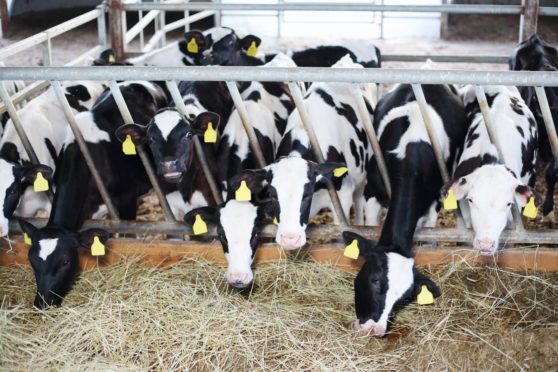A network of dairy farmers and beef finishers should be created to make the most of beef produced from Scotland’s national dairy herd, claims a Scottish farm consultant.
SAC Consulting senior beef consultant, Robert Ramsay, said increased use of both sexed and beef semen in dairy herds had essentially removed the lower-value black and white bull calf, and created an opportunity for more dairy calves to enter the beef supply chain.
“Farmers are selectively using sexed semen to breed replacement heifers from their best cows, with the rest being put to beef bulls with very high genetic merit to produce beef calves that, when finished, meet processor specification, helping to diversify farm income,” said Mr Ramsay.
“Many large retailers are phasing out butcher counters and the reality is that they’re looking for smaller 350kg carcase beasts, which produce a cut that is consistent for standard packaging, and the dairy bullock that finishes at 320kg to 350kg deadweight fits perfectly into that regime.”
He said a lot of Scottish beef dairy calves are currently finished in England, and there is scope to get the cattle sold and finished in Scotland instead.
“While the number of dairy herds has fallen, and beef suckler numbers are also in decline, there is an opportunity to develop a more joined-up approach to dairy beef production in Scotland,” said Mr Ramsay.
“The elephant in the room is that more than half of the cattle slaughtered in Britain are dairy-bred. There will always be a place for the suckler cow in Scotland, however as an industry we need to acknowledge the importance of the dairy sector in providing affordable beef to the market.”
He said a network of beef and dairy producers would bring financial benefits to dairy farmers as the sale of beef calves represents a 13th or 14th milk cheque to many milk-producing businesses.
In addition, Mr Ramsay believes using more dairy beef calves in Scotland will help ensure the future of beef processing facilities in Scotland.
“The cattle kill in Scotland is in decline and we need to ensure that we retain a critical mass of cattle in order to allow our beef processing industry to thrive,” said Mr Ramsay.
“There are some really good examples of integrated supply chains for dairy beef in Scotland but there is a real opportunity to grow this business significantly in the future.”
He said retailers, such as Morrisons, were already backing dairy suppliers to sell Belgian and British Blue cross calves into its beef-rearing partner business, Buitelaar Production.

